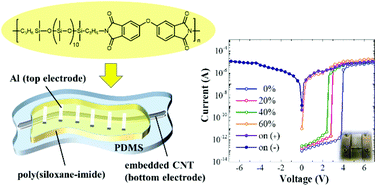Intrinsically stretchable, solution-processable functional poly(siloxane-imide)s for stretchable resistive memory applications†
Abstract
In this work, a stretchable resistive memory device was demonstrated using a functional polyimide with intrinsic stretchability. A series of poly(siloxane-imide)s based on different dianhydrides (ODPA, BPDA, and PMDA) and diamines with different siloxane lengths (DMS-A12 (molecular weight = 900–1000) and DMS-A15 (molecular weight = 3000)) were synthesized for a systematic study. By incorporating the flexible siloxane chain into the polyimide's backbone, the overall solubility and stretchability of the derived polymers can be improved. The memory behavior of these poly(siloxane-imide)s was first examined in the conventional structure, and a stable WORM-type memory property was observed. It could have resulted from the formation of a conductive filament induced by charge transfer and accumulation. Among all the studied polymers, ODPA-A12 showed a Young's modulus (1.596 MPa) compatible with the crosslinked polydimethylsiloxane (PDMS) elastomer, revealing promising potential for stretchable device fabrication. Based on this advantage, a stretchable resistive memory device was realized using ODPA-A12 as the active layer with the employment of the cross-linked PDMS elastomer as the substrate and a carbon nanotube (CNT) as the electrode (PDMS/CNTs/PI/Al). The device not only showed stable WORM-type memory characteristics with a high On/Off ratio (>106) under up to 40% strain, but also possessed high mechanical endurance under 20% strain for 600 stretching cycles. Our results highlight the merits of siloxane-containing polymers for applications in stretchable electronic devices.



 Please wait while we load your content...
Please wait while we load your content...